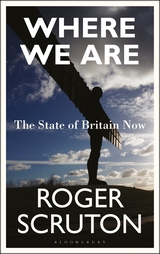Where We Are - The State of Britain Now
Roger Scruton (2017), Bloomsbury, London.
237 pages, £16.99. ISBN: 978-1-4729-4788-8

Sir
Roger Scruton is a political philosopher, university lecturer,
public commentator, opera composer, wine critic and all-round
good egg, who likes to write two books every year.
Scrutonia is his ‘world of farmers and philosophers, of Wagner
and wine, of animals and Aristotle.’ He self-identifies as
a ‘man of letters’.
Where We Are is Scruton’s latest volume. It is his
‘personal response to the Brexit decision’ (p. 1). Beyond
all those tangled economic and geopolitical arguments, Scruton
maintains there is a greater issue at stake, ‘namely the
question of identity: who are we, where are we, and what holds
us together in a shared political order?' (p. 2). He
believes that Western democracies are suffering from this crisis
of identity. ‘There can be no democracy without a demos, a
“we”, united by a shared sense of belonging’ (p. 7). And
the definition and significance of this “we”, this first-person
plural, is his book’s underlying theme.
For Scruton, British identity is special. Shaped by
history, Christianity, the Establishment and neighbourliness we
have a ‘reluctantnce to be governed by those whose attachments
lie elsewhere’ (p. 8). The Brexit vote highlighted this
trait. Yet he wants to explore how leavers and remainers
can be reconciled. He has some fascinating analyses and
answers. Patriotism rather than nationalism will be
required. It will be the sovereignty of the people
mediated by Parliament and the Common Law. This is
because, he argues, Britons have a strong sense of place and
community – ‘who we are is where we are’ (p. 23) – our
country and its customs is our home. This is oikophilia,
the love of home and hearth. Using David Goodhart’s
nomenclature, we are either ‘anywheres’ or ‘somewheres’.
The former live, move and have their being in metropolitan and
cyberspace networks, whereas the latter are more settled, less
politically regarded and consequently voted, ‘Leave’. Thus
the EU, as an ‘anywhere’ oikophobic project, was rejected.
All this is a refreshing examination of who and where we
are. But what of the future? Scruton does not duck
that question. He outlines several serious obstacles, such
as racism, the Common Agricultural Policy and radical
Islam. He says, the proper application of adaptive British
law is the key, rather than the federal administration of the EU
with its inflexible treaties. For example, it was the
intransigent Treaty of Maastricht (1992), with its redefinition
of the ‘free movement of labour’ and its citizens’ right to
reside anywhere in the EU, that created the current immigration
catastrophe.
And what about the Christian response? Scruton treats this
only indirectly. His religion is fogeyish Anglicanism – he
plays the organ at his local church. Yet he recognises and
rehearses some of the country-shaping influences brought about
by biblical Christianity. Regrettably, as we all know,
there are no simple answers to these huge post-Brexit
problems. But that should not prevent us thinking and
searching for them.
Where We Are is not an easy or a Christian read, but it
is a far-reaching, thought-provoking book. At times I wish
I could have cross-examined Scruton directly – his home
telephone number would have been such a useful addendum.
John R Ling
Aberystwyth

